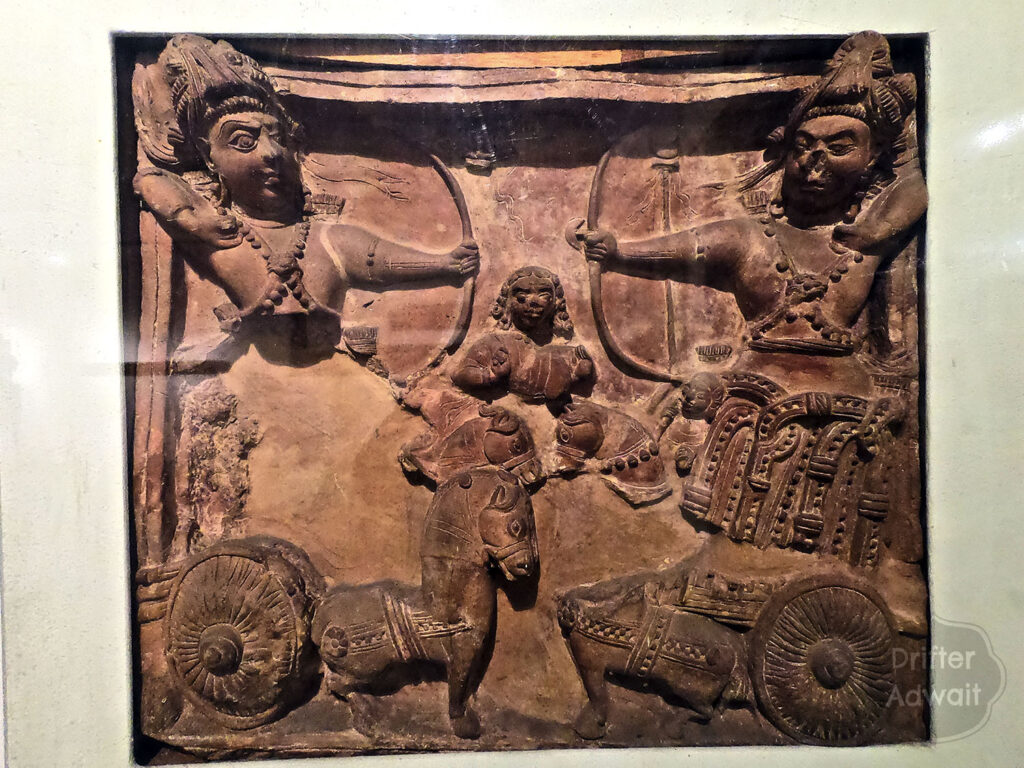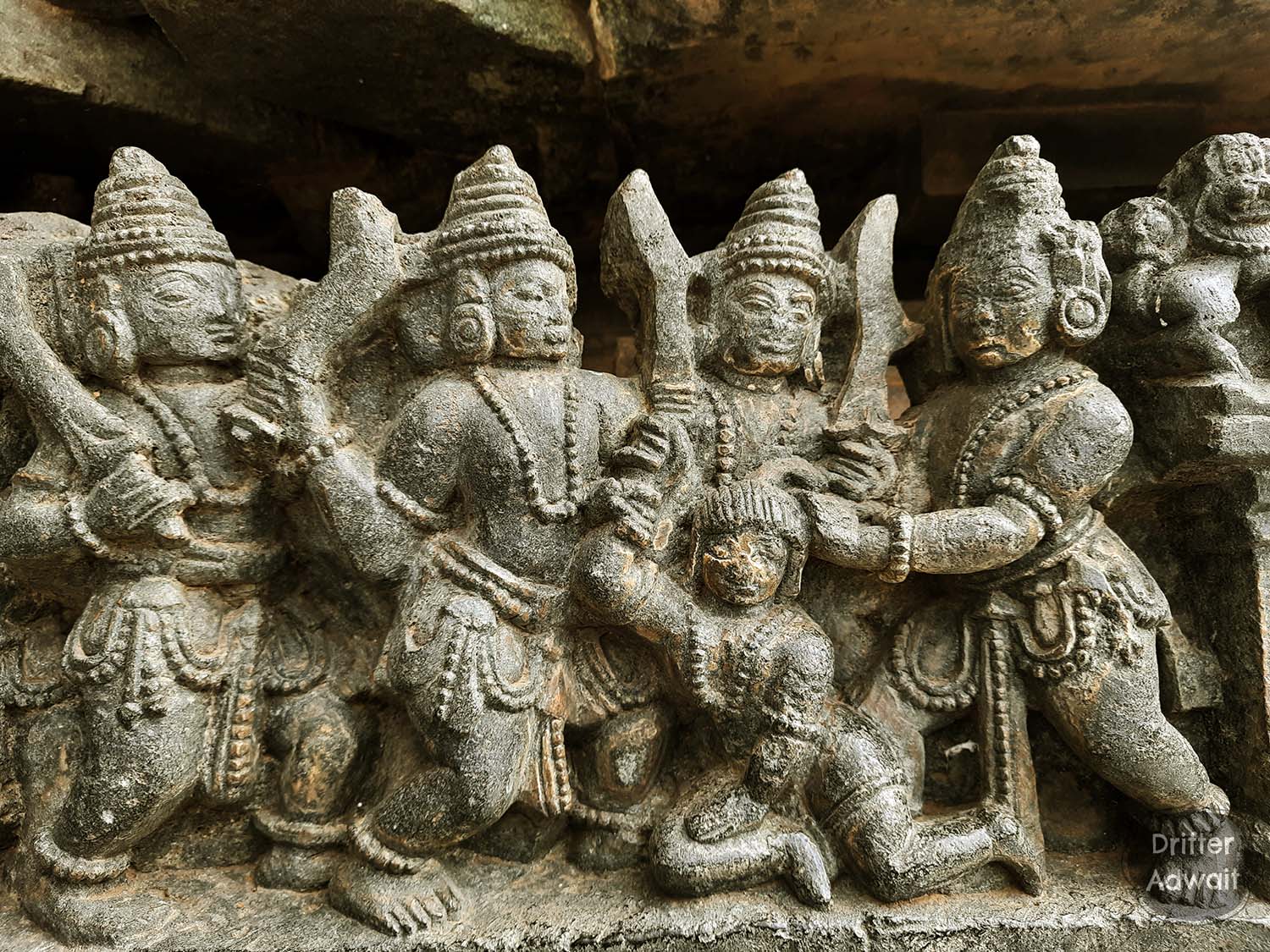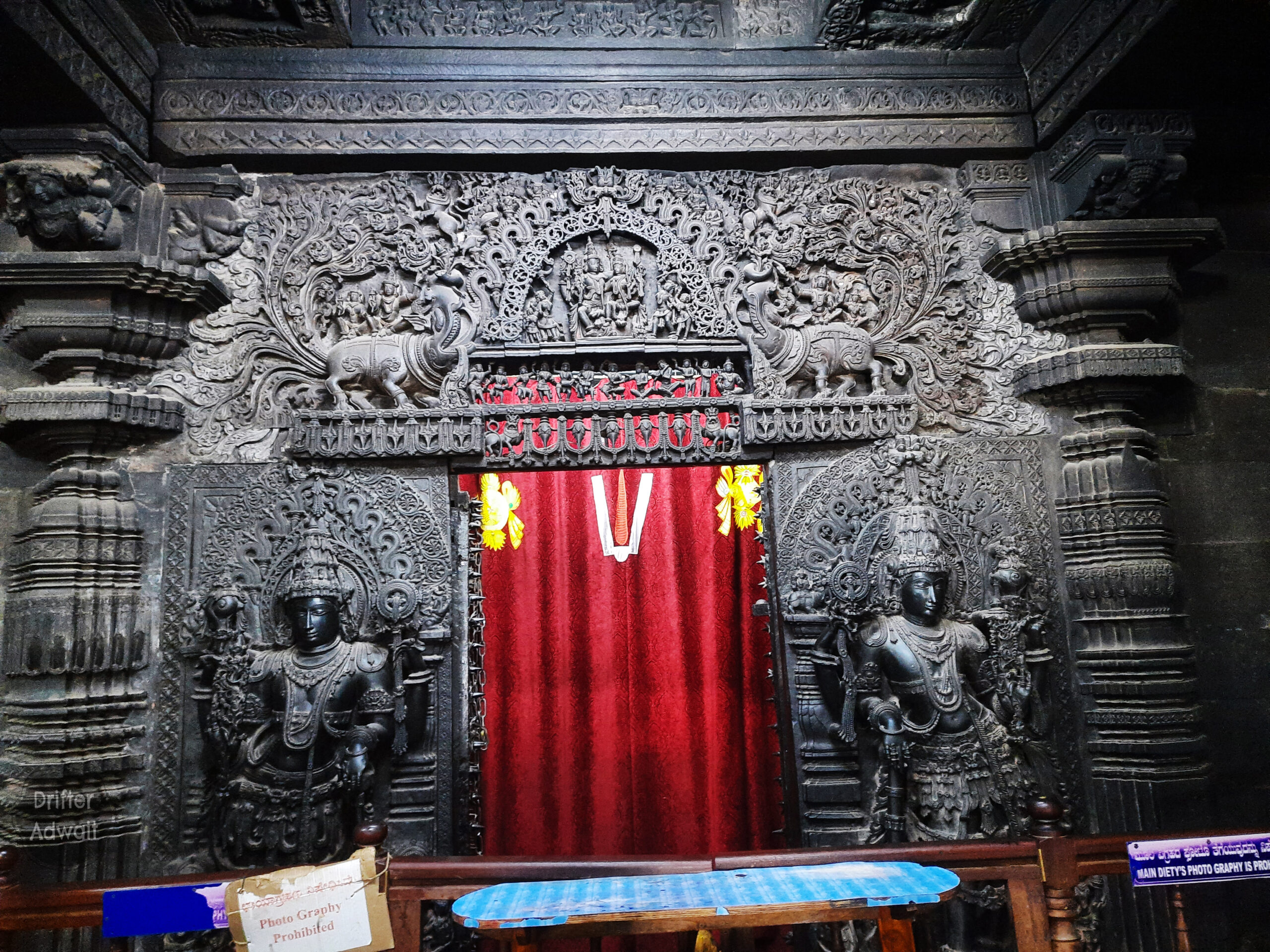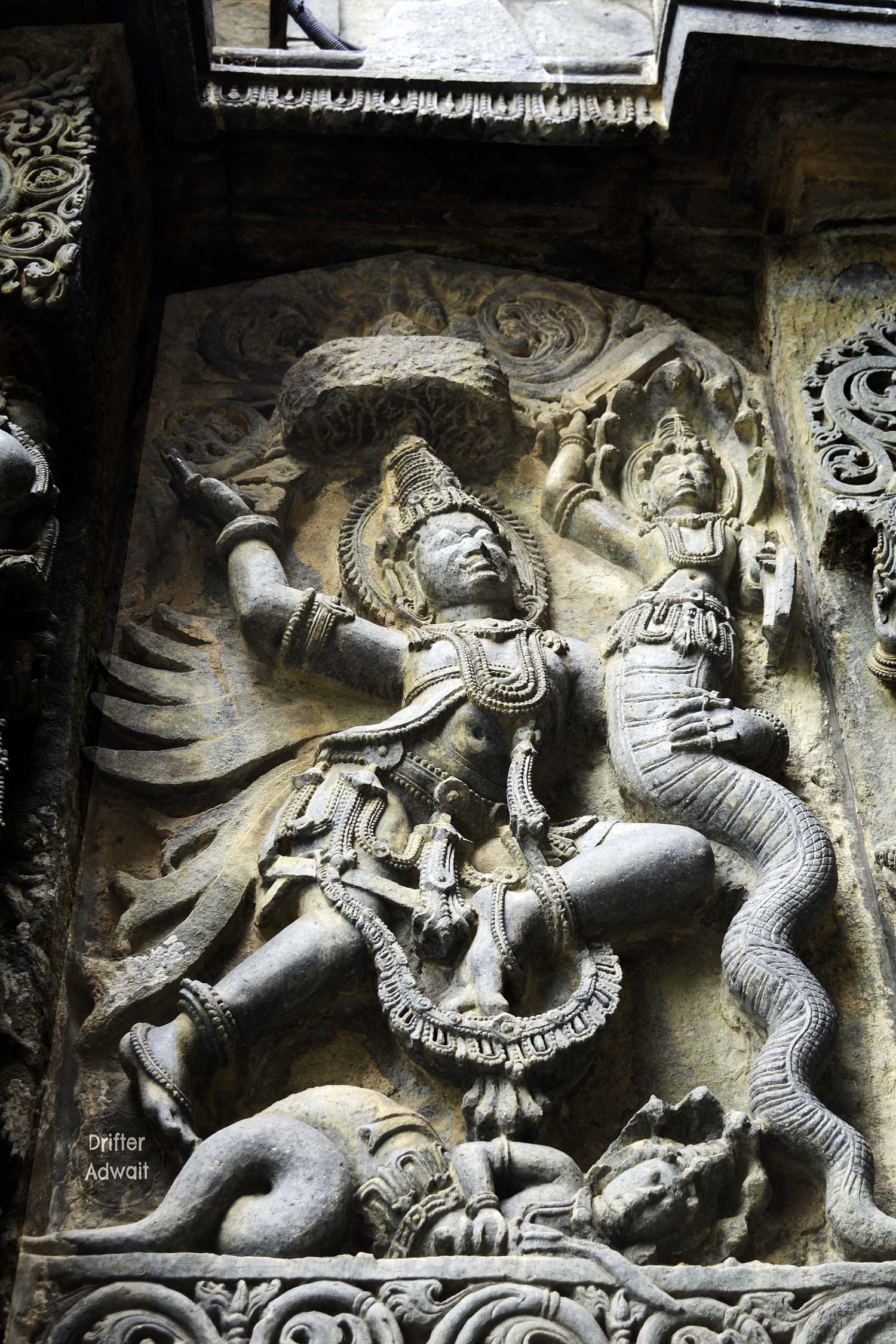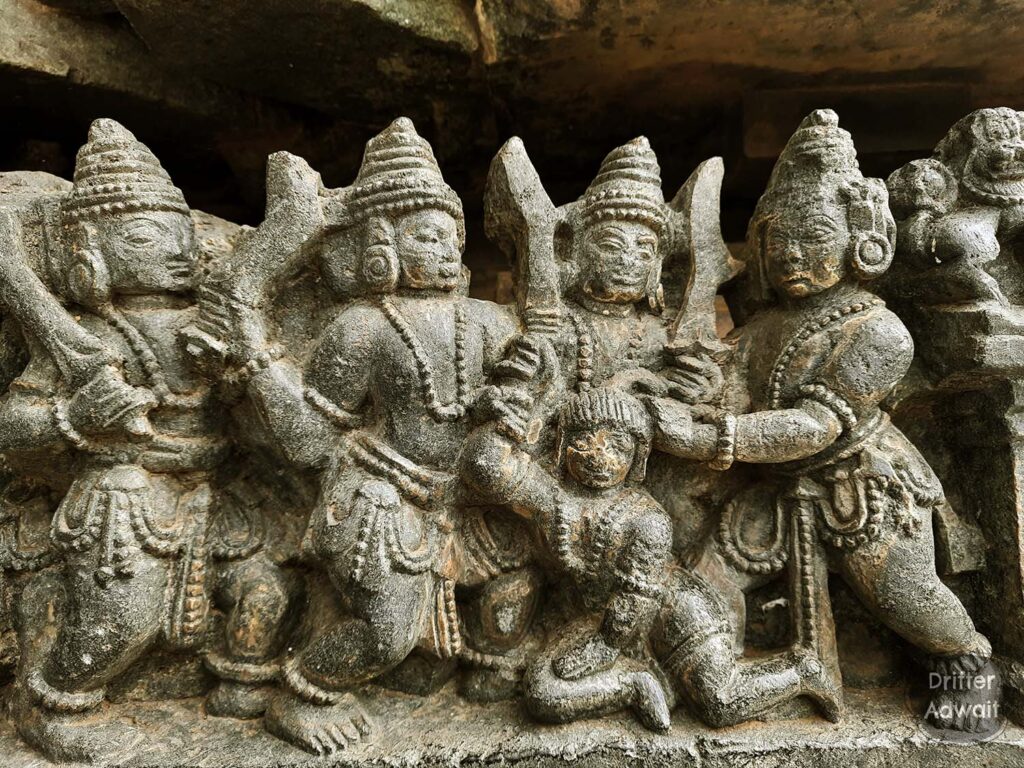
This exquisite panel can be found adorning the walls of the legendary Hoysaleshwara temple, located in the picturesque village of Halebidu in Karnataka, India. Here, you will be captivated by the presence of four individuals, each wielding a sword. Positioned beneath them, humbly on his knees, is a solitary figure. Of particular note is the warrior standing on the far right, who is seen delicately pulling a single strand of hair from the kneeling individual and severing it. For those familiar with the epic Mahabharata, it becomes evident that the central figure is Jayadratha, while the four figures surrounding him are none other than the valiant Pandava brothers. This sculpture offers a captivating portrayal from various angles, piquing curiosity and inviting further exploration, as discussed in the accompanying blog below.
Jayadratha, passing through Kamyak Vana
While on his way to the Shalva kingdom with his army to enter into matrimony, Jayadratha, the King of Sindhu, found himself journeying through the thick forests of Kamyakvana. It was during this passage that his gaze fell upon her—a lone figure standing at the entrance of an ashrama. Consumed by an overpowering desire, Jayadratha dispatched his friend King Kotikasya to approach the ashrama and gather more information about the alluring beauty who stood there, lost in solitude. And when Kotikasya, in all humility, made his inquiry, the beauty responded with her words;
अपत्यमस्मि द्रुपदस्य राज्ञः कृष्णेति मां शैब्य विदुर्मनुष्याः ।
साहं वृणे पञ्च जनान् पतित्वेये खाण्डवप्रस्थगताः श्रुतास्ते ।।
‘Prince of Shibi country! I am the daughter of King Drupada. people know me by the name of Krishna. I have chosen the five Pandavas as my husband, who used to live in Khandav-prastha. You must have heard their names.
युधिष्ठिरो भीमसेनार्जुनौ च माद्रयाश्च पुत्रौ पुरुषप्रवीरी ।
मां निवेश्येह दिशश्चतस्रो विभज्य पार्था मृगयां प्रयाताः ।।
Yudhishthira, Bhimsen, Arjuna, and Great worriers Madriputra – these are my husbands. Keeping me here, all of them have divided themselves and gone in all four directions to kill the violent animals.
Upon receiving this insight, King Kotikasya returned and proposed to his friend Jayadratha that he should meet and greet Draupadi before continuing their journey. Though harboring a malicious intent, Jayadratha reluctantly agreed to his friend’s seemingly innocent suggestion. As Draupadi busied herself with the task of gathering food and water for their guest, unaware of the impending danger, Jayadratha seized the opportunity and stealthily entered the hut where she was alone.
Jayadratha, driven by his desire and arrogance, presented his heart and the entire Kingdom of Sindhu to Draupadi, urging her to abandon the Pandavas and their arduous life in the forest. However, being the epitome of virtue, Draupadi firmly rejected his indecent proposal. She warned the lustful King about the dire consequences that would befall him if the Pandavas were to discover his inappropriate behavior. She reminded him of the formidable Gandiva bow wielded by Arjuna, the lethal strength of Bhima’s mace, and the righteous wrath of Nakula and Sahadeva. Yet, Jayadratha disregarded these rightful warnings, reducing women to mere objects of desire and precious gemstones.
Jayadratha abducting Draupadi
प्रगृह्यमाणा तु महाजवेन मुहुर्विनिःश्वस्य च राजपुत्री ।
सा कृष्यमाणा रथमारुरोह धौम्यस्य पादावभिवाद्य कृष्णा ।।
Then quickly moving forward, Jayadratha grabbed Princes Draupadi and forced her to sit in his chariot, while she was prostrating at Dhaumya Rishi who has arrived there…
In the dense forest, Pandavas encountered pretty terrible omens while hunting. Quickle, they regrouped and retreated to the Ashrama to realize what had happened. And, the chase began. Following the tracks, noise and the dust spreading in the air due to the army of Jayadratha, Pandavas soon reached near to that army, and just like in between Rakshasaj and Vanaraj, the battle began in between Jayadratha and the Pandavas. Soon, Yudhishthir killed the King of Trigarta, while Bhima slayed the King Kotikasya, the friend of Jayadratha.
Jayadratha fleeing the battle
हतेषु तेषु वीरेषु सिन्धुराजो जयद्रथः । विमुच्य कृष्णां संत्रस्तः पलायनपरोऽभवत् ।।
स तस्मिन् संकुले सैन्ये द्रौपदीमवतार्य ताम् । प्राणप्रेप्सुरुपाधावद् वनं येन नराधमः ।।
Sindhuraj Jayadratha trembled with fear at the death of those heroes and thought of running away leaving Draupadi there. Taking Draupadi off the chariot in the midst of that scattered army, evil Jayadratha sprinted towards the forest to save his life.
Yudhishthira carefully received Draupadi. Seeing distressed Draupadi, furious Bhima requested his elder brother to take Her safely to the Ashrama and proclaimed that he shall not let Jayadratha live see the next day.
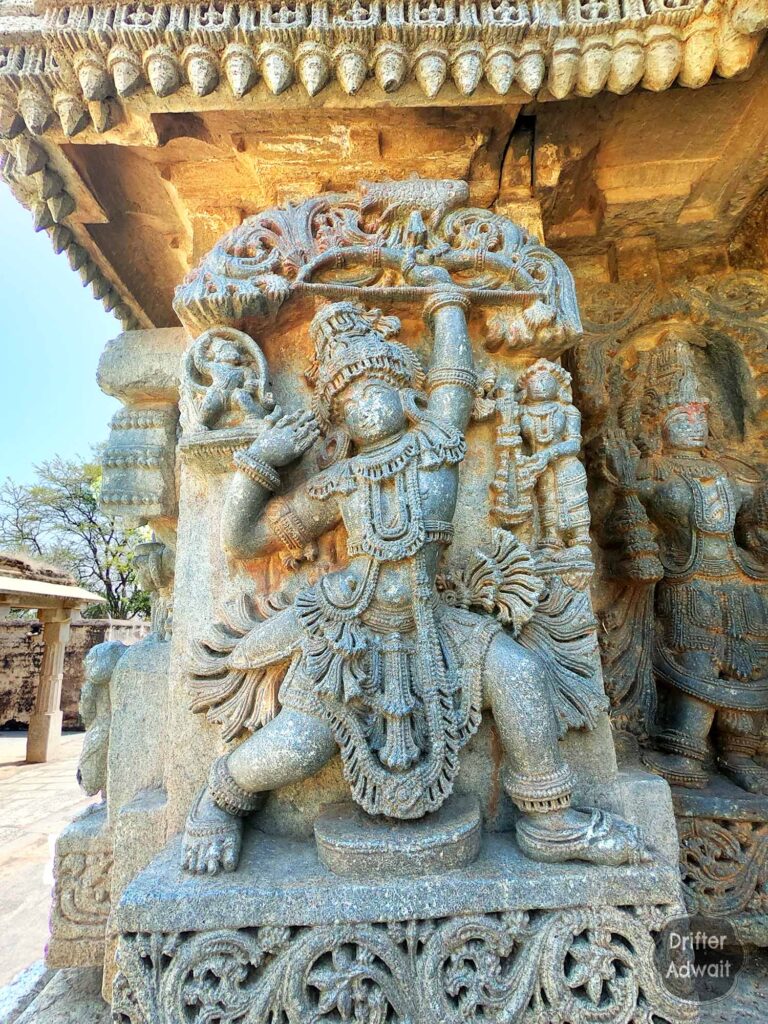
Draupadi’s advise to slay Jayadratha
न हन्तव्यो महाबाहो दुरात्मापि स सैन्धवः। दुःशलामभिसंस्मृत्य गान्धारी च यशस्विनीम् ।।
Yudhishthir said to Bhim- Oh Great one! Sindhuraj Jayadrath, though very wicked; should be spared, considering sister Dussala and Yashaswini mother Gandhari. (Jayadratha was married to Dusshala, the only sister of Kuru clan, and only daughter of Queen Gandhari).
तच्छ्रुत्वा द्रौपदी भीममुवाच व्याकुलेन्द्रिया । कुपिता हीमती प्राज्ञा पती भीमार्जुनावुभौ ॥
कर्तव्यं चेत् प्रियं मह्यं वध्यः स पुरुषाधमः । सैन्धवापसदः पापो दुर्मतिः कुलपांसनः ॥
Upon hearing Yudhishthira’s words, Draupadi’s composure shattered, and a surge of emotions overwhelmed her being. Despite her innate brilliance and unwavering boundaries, anger gripped her, and she directed her fury towards both Bhima and Arjuna, exclaiming, “If you truly love me, then you must slay that wretch! Jayadratha, the sinful and foolish man, is a stain and disgrace to the land of Sindhudesh. A man who dares to abduct another’s wife and seize a kingdom should not be allowed to live, even if he begs for mercy on the battlefield.”
As Jayadratha attempted to flee the scene, witnessing his cowardice, Arjuna summoned a divine weapon and skillfully targeted Jayadratha’s horses from an almost impossible distance. Fear-stricken, Jayadratha sought refuge amidst the dense forest, hoping to vanish from sight. However, the unstoppable force that was Bhima, with astonishing swiftness, caught hold of him by his hair, unleashing a relentless assault, intending to end his life.
Seeing this and remembering the order of the elder brother, Arjuna stopped Bhima from killing that wicked Yayadratha. Disappointed bBhima showed his dissatisfaction towards this decision, however,
एवमुक्त्वा सटास्तस्य पञ्च चक्रे वृकोदरः । अर्धचन्द्रेण बाणेन किंचिदब्रुवतस्तदा ।।
Uttering these words, Bhima swiftly employed a crescent-shaped arrow to shear Jayadratha’s flowing locks, carefully dividing them into five distinct braids. Overwhelmed with fear, Jayadratha trembled uncontrollably, unable to utter a single word in response to Bhima’s actions.
Following this, Bhima insulted Sindhuraj with biting words, saying, “You fool! If you wish to spare your life, heed my words and comply. Henceforth, attend the assemblies and gatherings of kings and openly declare yourself as the slave of Maharaja Yudhishthira. If you agree to this condition, I shall spare your life. This is the law for the defeated, as decreed by the victorious in warfare.” As Bhima spoke, he forcefully dragged Jayadratha along the ground.
Realizing the gravity of the situation, Jayadratha accepted the terms and conveyed his submission to the valiant Bhima, who had distinguished himself in battle. Binding him securely, Bhima hauled Jayadratha onto his chariot and brought him back to the ashrama, where he deposited him before Draupadi. Satisfied with the outcome, righteous Draupadi…
द्रौपदी चाब्रवीद् भीममभिप्रेक्ष्य युधितिरम् । दासोऽयं मुच्यतां राज्ञस्त्वया पञ्चसटः कृतः ।।
During this moment, Draupadi turned her gaze towards Yudhishthira and addressed Bhima, saying, “You have shaved his head and adorned it with five braids, making him a servant of the Maharaja. Therefore, release him now.”
Jayadratha was subsequently freed from his bonds. Overwhelmed by the turn of events, he approached King Yudhishthira, paying his respects before the assembled sages and humbly bowing his head at their feet. Arjuna, displaying his magnanimity, extended his hand to Jayadratha in a gesture of goodwill. King Dharmaputra Yudhishthira, renowned for his mercy, fixed his gaze upon Jayadratha and uttered, “Oh! You desired another man’s wife; how disgraceful! You are truly despicable, as are those who supported your heinous intentions. Who else but a coward like you would commit such an act against righteousness? Your deeds have brought condemnation upon you throughout the world. Sindhuraj, you are no longer a slave. Go now; you are released, and never repeat such actions again.”
With his head bowed in utmost shame, Sindhuraj Jayadratha departed, his head held low upon his shoulders. He retreated to the mountains, seeking a boon from Lord Mahadev himself to acquire the power to defeat the Pandavas. However, that tale shall be recounted on another occasion.
What can we learn from this whole incident involving Jayadratha, Pandavas and Draupadi?
The story emphasizes the significance of maintaining moral values and virtuous conduct in the face of temptation. Draupadi’s steadfastness in rejecting Jayadratha’s proposal showcases the importance of upholding righteousness even in challenging situations.
The story illustrates how one’s actions, driven by lust and desire, can lead to severe consequences. Jayadratha’s pursuit of Draupadi ultimately leads to his defeat, humiliation, and shame, highlighting the karmic repercussions of unethical behavior.
The story emphasizes the strength of character displayed by the Pandavas, who stand up against injustice and protect Draupadi. Their loyalty, courage, and adherence to dharma serve as spiritual inspirations, highlighting the importance of virtuous conduct.
Arjuna’s use of a celestial weapon and Bhima’s physical prowess demonstrate the presence of divine assistance in the face of challenges. The story suggests that the divine supports those who uphold righteousness and protect the righteous.
The story also offers the possibility of redemption and transformation. While Jayadratha faces the consequences of his immoral actions, he is given a chance to reflect, reform, and learn from his mistakes. This reflects the spiritual principle of personal growth and the potential for inner transformation. Jayadratha’s subsequent journey to seek divine assistance against the Pandavas hints at his desperation and determination for revenge, setting the stage for future events.
As we end another fascinating journey through the rich history and mythology of India, I hope you have enjoyed learning about the unique architecture and captivating sculptures that adorn our ancient temples. My mission with DrifterAdwait.com is to shed light on the wonders of our heritage and inspire a love for our shared cultural legacy.
If you found this post informative and entertaining, please share it with your friends and family interested in India’s rich cultural heritage. Don’t forget to comment and let me know which temple or sculpture you’d like me to explore next.
And as always, keep exploring, keep wandering, and keep discovering the magic of this beautiful land!
